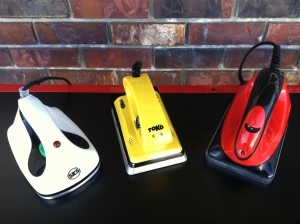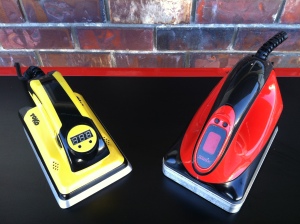How to Choose a Hot waxing Iron
The following is an excerpt of an article I wrote for Ski Racing Magazine a while back.
While waxing corks, hot boxes and thermo wraps have all earned their places in the world of waxing the electric wax iron is still the most widely used method of getting wax into a base. Readily available, easy to use and affordable with practice they can provide a safe, penetrating and durable wax. There are two types of electronic wax irons on the market today – analog and digital.
Tognar Chugger, Toko T8 and Swix T7311 Analog Waxing Irons
Analog wax irons utilize a thermostat to regulate temperature. During use the thermostat switches on and off as needed to stay within range of the set temperature. The difference between the high and low temperature is referred to as the thermostat window. The desired temperature is set by turning an incrementally marked dial.
Analog wax irons range in price from an affordable $40 up to $200. The more expensive waxing irons are fitted with better thermostats (less temperature fluctuation), thicker base plates (better heat retention) and more advanced heating elements with better coverage (more consistent heat across the base plate). An inexpensive analog wax iron is fine for occasional waxing, but those waxing often especially with fluorocarbons should look toward the upper end for best results.
It is important to note that waxing irons differ from common household irons. They will not have holes in the base plates, the base plates will be thicker, and they will also have more advanced heating elements that, in conjunction with the thicker base plate, produce a more even heat across the base plate.
An analog iron can be calibrated using a coil-type thermometer such as the one made by Coverite™, the Sun Valley Ski Tools Wax Iron Platform or in a pinch a dial stem thermometer. Set the dial of the iron to a desired temperature and allow it to heat up. When the thermostat in the iron turns off the temperature will begin to drop, at a certain point the thermostat will click on and the temperature will begin to climb, this is called the thermostat window. In this way an analog iron stays near the desired set point temperature, the thing to watch out for is wide fluctuations (more than 8˚C). Keep in mind; some irons are designed to heat slightly past the temperature marked on the dial to counteract the heat loss incurred when the iron comes in contact with the ski base. The data from this test helps determine where the dial should be set for the safest optimal temperature for a particular wax. It’s not a bad idea to check older irons as the thermostat can become less accurate with age. It is not necessary to calibrate a digital iron due to their use of a microprocessor.
As mentioned above, digital wax irons rely on a microprocessor rather than a thermostat to regulate temperature. The microprocessor simultaneously measures the iron temperature and adjusts the heating power to maintain a set temperature with minimal fluctuation. The consistency of temperature reduces the risk of base damage due to excessive heat, especially when applying powder or block overlays. Digital wax irons range in price from $120 up to $400. Price is dictated by microprocessor technology, base plate thickness and type of element used.
Toko T14 and Swix T71A Digital Waxing Irons
Any tool has the potential of doing more harm than good if used improperly and a wax iron is no exception. Good technique is essential for effective waxing and avoiding damage to the ski or board base.
Heat is a necessary component of waxing, it not only melts the wax but encourages the pores of the base to open up and accept the wax. But too much heat can seal the pores of the base and prevent good wax absorption. To prevent damage assure that the iron is operating at the correct temperature for the wax chosen. Manufactures often mark recommended melt temperatures on the packaging. It is best to use the least amount of heat to melt the wax, the slower you are able to move the iron along the ski base the better the wax penetration will be and low heat is the best way to achieve this.
It is essential to maintain a pool of wax beneath the iron. This provides a protective layer between the hot iron plate and the base. A hot iron base plate in direct contact with a ski or board base is the most important thing to avoid.
Be mindful of where the iron is set when not in use. Set it upright on the bench or in a holder such as the one made by Swix. Contaminants on an iron’s base plate can mix with the wax and scratch the ski or board base. Occasionally wipe the iron’s base plate with a piece of Fiberlene or lint-free rag and remove any excess wax build-up around the base plate as it tends to burn and producer smoke overtime. A clean iron is a happy iron!
 Default Currency
Default Currency
 Australia
Australia
 New Zealand
New Zealand
 European Union
European Union
 Canadian Dollar
Canadian Dollar

